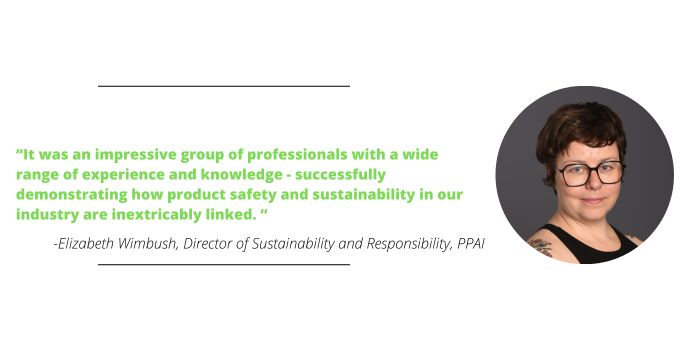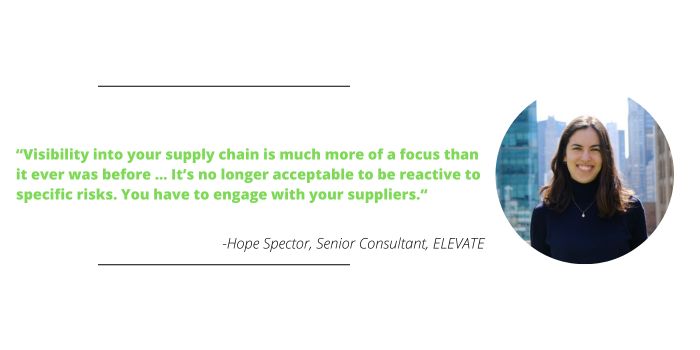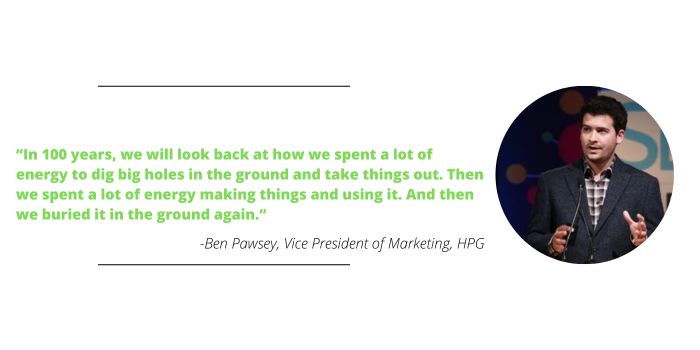Sustainability: A Journey, Not A Destination, Summit Speakers Say
Following a successful and insightful opening, the third and final day of the 2023 Product Responsibility Summit shifted gears slightly to focus on sustainability and supply chain transparency, with an overall message that safety and sustainability are not end goals but require ongoing effort.
“Getting suppliers and distributors together to listen to the content and actually go off and talk about it and how they can collaborate and have one way forward instead of having everybody go off and do it in their own way, I believe is healthy for the industry,” says Brian Campbell, co-chair of Summit and vice president of supply chain compliance with platinum event sponsor Wisconsin-based 4imprint, the No. 1 distributor of the PPAI 100 and a platinum sponsor of the event.
Elizabeth Wimbush, PPAI’s director of sustainability and responsibility, adds, “It was an impressive group of professionals with a wide range of experience and knowledge. Successfully demonstrating how product safety and sustainability in our industry are inextricably linked. The depth of passion and collaborative spirit was inspiring, with some great actionable takeaways. It was inspiring to be amongst so many dedicated and committed industry pros.”

Julia Craighill, chief sustainability officer with the Green Business Bureau, started the day with a review of the 17 United Nations Sustainable Development Goals and emphasized the importance of reporting, transparency and partnerships in addressing these issues.
“This is a continuing improvement process that takes everyone doing it all the time,” she says.
The discussion titled “Complete Business Sustainability” focused on the importance of corporate values and storytelling to engage employees, customers and end users.
“People come to you when you care about things,” says Denise Taschereau, co-founder and CEO of Fairware Promotional Products and a PPAI board member. “… We take a lot of inspiration from what’s important to our clients and staff.”
Teresa Fudenberg, CEO of Minnesota-based supplier Storm Creek, a platinum sponsor of the event, says she’s excited by the growing demand for recycled and eco-friendly fibers in the promo industry and encouraged attendees to take whatever steps they can toward improvement.
“It’s easier to be overwhelmed by everything happening, but you can take it one bite at a time,” she says.
Both emphasized the importance for sharing your story with your sales team, as well as customers and end users:
- “What is the story the end user wants to hear?” says Taschereau, suggesting that attendees think of supply chain transparency through the lens of a connection, not regulation, to make the story more compelling.
- “One of the things we measure is the number of plastic bottles recycled in every garment. Our customers are counting, too,” says Fudenberg. “… I love that we measure, and I love that we help others measure.”
Taschereau encouraged attendees to talk to industry peers “so we’re moving in the same direction” and to reach out to retail for ideas. “Retail has been doing this longer than us, so let’s call them and ask what we can do better.”
In a session on international due diligence, Campbell and Hope Spector, a senior consultant with ELEVATE, spoke about the growing market and regulatory pressures toward greater traceability and transparency, including:
- Emerging human rights/labor legislation.
- Shifting focus from disclosure to enforcement (detained shipments).
- Increasing attention from consumers and investors.
“Visibility into your supply chain is much more of a focus than it ever was before,” says Spector. “… The trend is increasing, [and] it’s a requirement that human rights are embedded in your company’s strategy. … It’s no longer acceptable to be reactive to specific risks. You have to engage with your suppliers.” If a factory doesn’t respond to your request for information, that’s a major red flag, she adds.
Campbell polled the audience on what their biggest challenge is when it comes to supply chain due diligence, and 4 in 10 (41%) said they didn’t have sufficient internal resources to conduct a sufficient level of supply chain mapping. He also acknowledged that it’s impossible to “do everything” when it comes to these issues.
“You should take a step backward and understand what it is you’re being asked to do,” Campbell says. “… Pick a couple lanes and do that really well. … Don’t let perfection stop you from moving forward.”

Extended producer responsibility is a growing issue, with laws in four U.S. states (California, Colorado, Maine and Oregon) and more proposed across the country. Andrew Hackman, principal lobbyist with Serlin Haley, explained to attendees that local governments are tired of the costs and operations required to deal with plastics and other recyclable waste. “We can’t recycle our way out of this crisis,” he says.
- Consumers want more recycling, but not everything with a symbol stamped on it can actually be recycled due to limited access.
- Emerging producer responsibility laws aim to shift the burden to producers, defined in the four existing laws as the entity that sells or distributes a product – so most promo companies.
- “From a consumer’s perception, it’s the entity that manufactured the product that’s packaged,” who’s responsible for that packaging,” Hackman says, adding that regulators take a similar stance.
During Q&A, one attendee shared an online CSR Risk Check tool that can help companies gauge their exposure to international CSR risks and suggest actions to manage them.
The event provided both eye-opening details and the opportunity for promo pros to compare notes. PPAI's Wimbush says, “Having these expert speakers come to us with their opinions and experience on the different topics and ranges that we’re talking about that all fit into that big picture is a really good way to bring everybody together and have a good group of both experts and people who can push the change in our industry forward.”
After lunch, Jodi Gruder, global director of compliance for BAMKO, the PPAI No. 4 distributor; and Josh Diamond, employee health and wellness manager for Hit Promotional Products, the PPAI 100 No. 4 supplier; discussed how safety and sustainability intersect. Both agreed that safety comes first and that training is the first step. They also agreed that communicating your efforts to employees and customers is critical.
Educating employees on how they fit into in the company’s safety and sustainability efforts is also critical, says Diamond. “Communicating their role in those initiatives has made a big difference,” he says.
Gruder emphasized the importance of materials testing and rethinking how promo goods are packaged.
“Everybody wants their shirts to arrive perfectly folded in a poly bag, but that poly bag is a waste,” she says, adding that alternatives like molded trays made of recycled paper or fibers may work even better for some products. “You have to teach people about it, because a lot of people don’t think about it.”
Sustainability and safety ultimately go hand in hand, says Diamond. “Maybe there’s no hard and fast legal regulation, but it’s very customer driven. They want to know that we’re conducting our business in a safe and sustainable manner, and we have to be able to back that up.”
Purchasing verified carbon offsets and renewable energy certificates is one way to do that, says Gabrielle Guitzkow, CarbonNeutral certification program manager for Climate Impact Partners. She highlighted the difference between offsets and emissions reduction: “When you’re using offsets, you’re balancing out your emissions,” not actually reducing output, she explains.
- Like many other Summit speakers, she says audits and documentation are key. “You cannot act on what you have not measured,” she says.
- When it comes to choosing projects to support via offsets, she says, use what’s important to your company to decide.
- She recommends the International Carbon Reduction and Offsetting Accreditation (ICROA) to vet potential programs.
- Guitzkow also urged attendees to share their efforts. “Your customers want to hear that you’re taking measurable action.”
Ben Pawsey, vice president of marketing at supplier HPG – the No.8 supplier in the 2023 PPAI 100 – spoke on building sustainability processes and reporting with an organization, drawing on his experience with the company and his years with Sustainable Brands, a producer of news, events and other learning solutions for sustainability leaders.
In his session, Pawsey focused on how to become an effective “intrapreneur” within an organization, acting as a change agent and building consensus toward effective sustainable practices. These include engaging decision-makers, making the case to stakeholders, defining a narrow scope and finding quick wins.
Sustainability can be embedded in companies’ business strategies, Pawsey notes. “In 100 years, we will look back at how we spent a lot of energy to dig big holes in the ground and take things out. Then we spent a lot of energy making things and using it. And then we buried it in the ground again.”

The final session covered the “five Rs” of waste management. Ron Hawk, director of collaborative sales for Looptworks, a recycling partner, offered a look at potential ways to move from a linear materials model toward circularity – such as upcycling, downcycling or fabric shredding and reweaving – as well as pragmatic solutions for accomplishing each.
“The biggest thing is to help brands avoid the landfill,” Hawk says. “… The future is exciting on this stuff. The chemistry is there.”
Rick Brenner, MAS+, president of Product Safety Advisors and co-chair of the event, says, “PPAI has been able to bring leading thought leaders, regulators and professionals to share their expertise that most companies in the industry do not have access to. A huge reason that industry companies come year after year is the ability for product safety and compliance professionals to network with peers from competitor companies, to share lessons learned and to help the whole industry stay safe and compliant, and that benefits everyone.”
The event closed with a final networking reception to give attendees one more chance to share ideas. And on Wednesday, October 11, more than 20 Summit attendees joined a tour of the Prince George’s County Material Recycling Center in Maryland. Staff at the center explained how facilities such as these serve the community, its policies and the procedures and technologies it uses to separate and process materials.
- The material recycling center was opened in 1993 and upgraded in 2007 and 2021.
- 172,000 residents in the county participate in the program, No.1 in the state.
- The facility produces 13 types of raw material commodities.
- In 2022, it processed 77,000 tons of material.

